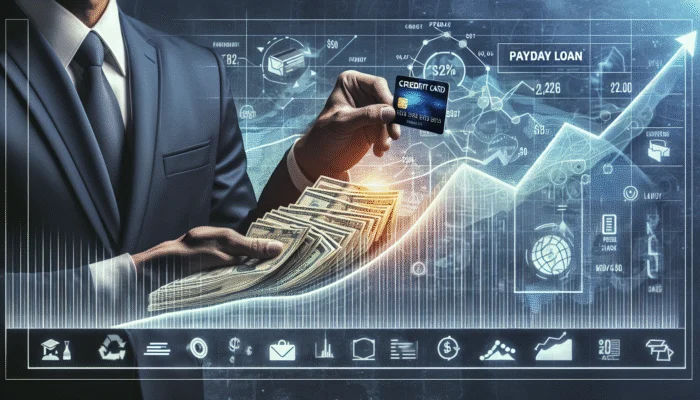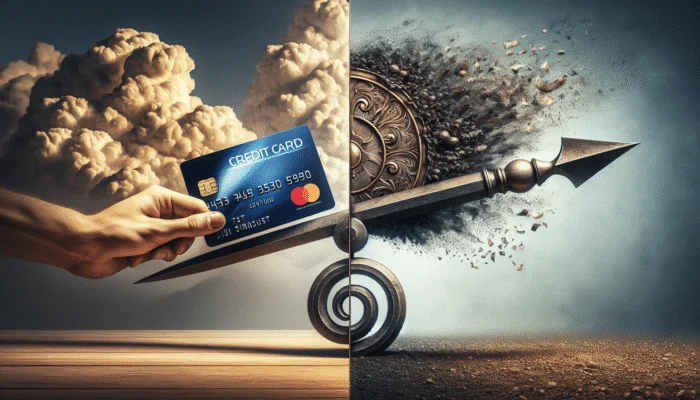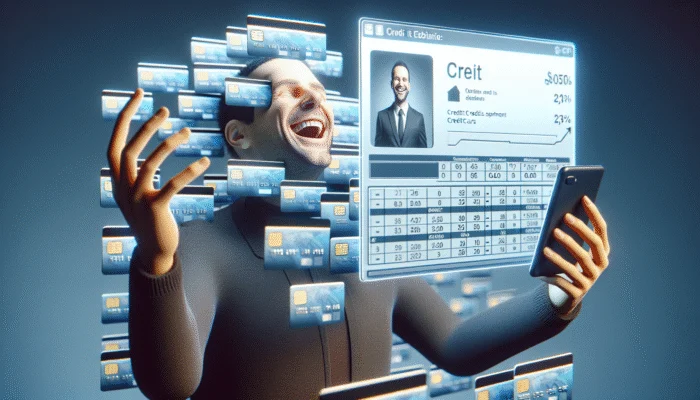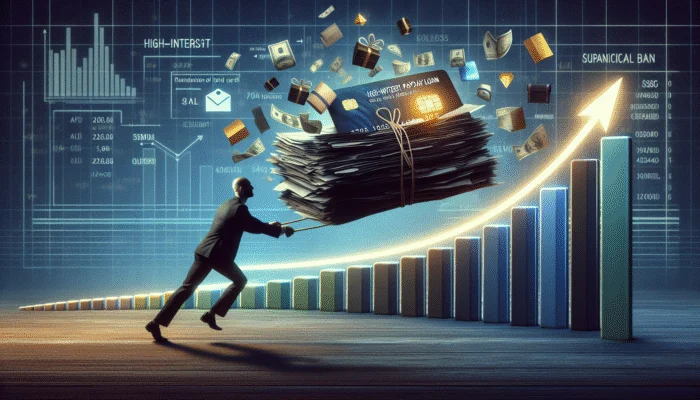Key Insights
- Credit Cards: Credit cards allow flexible borrowing with the potential to earn rewards.
- Payday Loans: Payday loans are high-interest, short-term loans that can lead to debt cycles.
- Comparison: Credit cards offer ongoing borrowing options, unlike the one-time nature of payday loans.
- Transitioning: Moving from payday loans to credit cards can improve financial health if managed wisely.
Understanding Credit Cards and Payday Loans

What Are Credit Cards?
Credit cards are financial instruments issued by banks enabling individuals to borrow money for purchases up to a certain limit, which must be repaid with interest. They are convenient, flexible, and can also offer various rewards and benefits. Here’s a concise bullet list of key features of credit cards:
- Credit Limit: The maximum amount you can borrow.
- Interest Rates: The cost of borrowing, often varying based on your creditworthiness.
- Rewards Programs: Points, cash back, or travel benefits for spending.
- No Interest Grace Period: Time to pay your balance in full before interest accrues.
- Minimum Payment: The least amount you need to pay each month.
- Annual Fees: Some cards charge a yearly fee for use.
- Fraud Protection: Many cards offer robust security features against unauthorized use.
- Online Management: Easy access to your account details and transactions online.
Understanding these features is crucial for making informed decisions about credit cards, especially when considering them as an alternative to payday loans.
How Do Payday Loans Work?
Payday loans are short-term, high-interest loans typically designed to be repaid by the borrower’s next payday. They usually come with steep fees and interest rates, making them a costly solution for immediate cash needs. The borrower provides a post-dated check or authorizes an automatic debit for the loan amount plus fees. If the loan isn’t repaid on time, it can initiate a cycle of debt, as borrowers often take out new loans to pay off the old ones, leading to insurmountable financial strain. While they may provide quick access to funds, the long-term implications can be devastating for borrowers, often trapping them in a vicious cycle of debt that can damage their financial health.
Comparing Credit Cards and Payday Loans

Credit cards and payday loans differ significantly in terms of structure, costs, and long-term effects. Credit cards allow for ongoing borrowing with the flexibility to pay over time and the potential to build credit. In contrast, payday loans are short-term solutions with very high interest rates and fees that can quickly escalate into a larger financial burden. Understanding these differences is key to making informed financial decisions. By using credit cards wisely, consumers can manage their finances better and avoid the pitfalls commonly associated with payday loans.
Expert Insights on How to Use Credit Cards Instead of Payday
What Are the Long-Term Benefits of Using Credit Cards?
Using credit cards responsibly can yield significant long-term benefits like improved credit scores and rewards for spending. When managed effectively, credit cards can enhance your financial profile. For instance, timely payments contribute positively to your credit history, which makes you eligible for better interest rates on future loans, such as mortgages or auto financing. Additionally, many credit cards offer cashback, points, or travel rewards, turning everyday purchases into future benefits. Real-world examples demonstrate that individuals who utilize credit cards strategically—like using them for regular expenses and paying the balance in full each month—enjoy not only financial flexibility but also rewards that can fund vacations or offset significant purchases.
How Can Credit Cards Help Build Credit?

Responsible credit card use is one of the most effective methods to build credit. When you use a credit card and make consistent, on-time payments, you strengthen your credit history, which directly influences your credit score. Here are actionable steps for building credit with credit cards:
- Pay On Time: Always make payments by the due date to avoid late fees and negative marks on your credit report.
- Keep Balances Low: Aim to use less than 30% of your credit limit to keep your credit utilization ratio healthy.
- Establish a Payment Plan: Create a budget that allows for regular payments and avoid the temptation to carry a balance.
- Consider Becoming an Authorized User: Ask a family member with a good credit score to add you as an authorized user on their card.
These strategies not only help in building credit but also promote responsible financial habits that can benefit individuals for years to come.
What Should You Look for in a Credit Card?
When choosing a credit card, several factors merit consideration, including interest rates, fees, rewards, and credit limits. Here’s a deeper analysis of these critical aspects:
– Interest Rates: Look for cards with competitive APRs, especially if you anticipate carrying a balance.
– Fees: Be aware of annual fees, late payment fees, and balance transfer fees that can add up quickly.
– Rewards: Consider how you typically spend money. Some cards offer higher rewards for groceries, travel, or gas, aligning with your spending habits.
– Credit Limits: Ensure the credit limit suits your financial needs while maintaining a healthy credit utilization ratio.
By carefully analyzing these factors, you can select a credit card that aligns with your financial goals and spending patterns, maximizing benefits while minimizing costs.
How Can Credit Cards Prevent Payday Loan Cycles?
Using credit cards can be a vital strategy in preventing the cycle of payday loan debt. By offering a more flexible and lower-cost alternative, credit cards can help individuals manage their financial situations more effectively. Key strategies include:
- Using Credit for Emergencies: Reserve your credit card for genuine emergencies rather than everyday purchases.
- Establishing a Budget: Create a spending plan to avoid overspending and leaving yourself short for essential bills.
- Automating Payments: Set up automatic payments for fixed expenses on your credit card to ensure timely repayment.
- Building an Emergency Fund: Gradually save to cover unexpected expenses without relying on credit.
By adopting these practices, individuals can reduce their dependence on high-interest payday loans and cultivate sustainable financial habits that foster stability and peace of mind.
What Are the Risks of Using Credit Cards Over Payday Loans?
While credit cards provide numerous benefits, they are not without risks. High-interest rates can quickly escalate debt if balances are not managed properly. When utilizing credit cards, it’s crucial to be aware of potential pitfalls, such as:
– High Interest Rates: If you don’t pay your balance in full, you may incur significant interest charges, which can negate the benefits of using credit over payday loans.
– Potential for Debt Accumulation: Overspending on credit cards can lead to accumulating debt that becomes unmanageable.
– Impact on Credit Score: Missing payments or maxing out your credit limit can harm your credit score, limiting future borrowing potential.
Effective management and a clear understanding of these risks are essential for maintaining healthy credit practices and preventing financial difficulties.
How to Transition from Payday Loans to Credit Cards
What Steps Should You Take to Switch?
Transitioning from payday loans to credit cards is a process that requires careful planning and execution. Here are essential steps to facilitate a smooth switch:
- Assess Your Current Financial Situation: Take stock of your debts, income, and expenses to understand your financial landscape.
- Check Your Credit Score: Knowing your credit score will help you select credit card offers that suit your credit profile.
- Research Credit Card Options: Look for cards with low interest rates and favorable terms to replace payday loans.
- Develop a Payment Plan: Create a budget that allows for paying off the new credit card balance on time.
By following these steps, you can effectively transition to using credit cards, ultimately fostering a healthier financial future and breaking free from the cycle of payday loans.
Managing Debt with Credit Cards
Using credit cards to pay off payday loans can be beneficial if done correctly. This approach requires a strategic plan to ensure that you stay on track and avoid falling into further debt. Here are several strategies for effective debt management:
– Consolidate Debt: Consider transferring payday loan debts to a credit card offering a 0% introductory APR for balance transfers. This can provide temporary relief from interest, allowing you to focus on paying down the principal.
– Set Up a Payment Schedule: Create a clear repayment schedule for your credit card debt and prioritize making more than the minimum payment to reduce interest charges.
– Track Your Spending: Monitor your credit card transactions closely to avoid accruing additional debt while trying to pay off existing loans.
By implementing these strategies, individuals can successfully use credit cards as a tool to manage and eliminate payday loan debt, ultimately leading to improved financial health.
Avoiding Common Pitfalls
Understanding the risks associated with credit card usage is crucial when transitioning from payday loans. Common pitfalls include relying too heavily on credit cards for everyday expenses and failing to make timely payments. Here are some strategies to avoid these missteps:
- Establish Spending Limits: Set a monthly cap on how much you can spend on your credit card to prevent overspending.
- Automate Payments: Set up automatic payments to ensure bills are paid on time and avoid late fees.
- Regularly Review Statements: Keep an eye on your credit card statements to catch any discrepancies or unauthorized charges.
- Educate Yourself: Understand the terms of your credit card agreements and the consequences of missing payments.
By being proactive and aware of these potential issues, individuals can mitigate risks and cultivate a healthier relationship with credit, steering clear of the traps that often ensnare those transitioning from payday loans.
Benefits of Using Credit Cards Over Payday Loans
Utilizing credit cards instead of payday loans presents distinct advantages that can lead to long-term financial health. Credit cards typically offer lower interest rates compared to payday loans, which can often exceed 400% APR. Here are several notable benefits:
– Building Credit History: Responsible credit card use builds a positive credit history, improving your credit score and future borrowing potential.
– Flexibility: Credit cards provide a revolving line of credit, allowing you to borrow as needed without immediate repayment pressures.
– Rewards and Benefits: Many credit cards offer rewards programs, cashback options, and additional benefits like travel insurance and purchase protection.
– Better Financial Options: With improved credit, you may qualify for lower interest rates on other loans, further enhancing financial security.
By leveraging these benefits, individuals can create a more robust financial future, moving away from the burdensome world of payday loans.
What Are the Risks of Using Credit Cards?
What Happens If You Miss a Payment?
Missing a credit card payment can have significant repercussions, including negative impacts on your credit score and incurring late fees. Credit card companies typically report missed payments to credit bureaus, and a single late payment can drop your score by several points, affecting your future borrowing potential. Additionally, late fees can add up quickly, further exacerbating your financial situation. To mitigate these risks, it’s essential to set reminders for payment dates and consider setting up automatic payments to ensure you stay current on your accounts. Establishing a habit of timely payments safeguards your credit health and helps you avoid costly penalties.
How Can High Interest Rates Affect You?
High-interest rates on credit cards can significantly impact your financial health, especially if balances are not paid off monthly. When you carry a balance, the interest accumulates, increasing your debt load over time. For instance, a card with a 20% APR will result in hefty interest charges on any remaining balance each month, making it harder to pay down the original debt. To manage high-interest rates effectively, focus on paying off the full balance each month. If that’s not feasible, prioritize payments on cards with the highest rates and consider balance transfer options to lower your interest burden. Being proactive about managing interest rates is crucial for maintaining financial stability.
What Is the Danger of Overspending?
Credit cards can foster overspending due to their convenience and the psychological effects of “buy now, pay later.” This can lead to accumulating debt that becomes overwhelming. To control spending, it’s vital to establish a realistic budget that incorporates credit card use. Monitor your spending habits and stay within your limits. Additionally, consider implementing strategies such as using cash for everyday purchases or limiting credit card use to essential expenses. By remaining vigilant and mindful of your spending, you can avoid the pitfalls of overspending and maintain a healthy financial balance.
What Are the Risks of Identity Theft?
Credit card information is a prime target for identity theft, which can lead to unauthorized charges and significant financial loss. Protecting your data is paramount. Utilize strong passwords and enable two-factor authentication for online credit card accounts. Regularly review your statements for suspicious activity and report any discrepancies immediately. If you suspect your information has been compromised, contact your credit card issuer right away to mitigate potential damages. Educating yourself on identity theft prevention strategies is essential for safeguarding your financial health in a digital world.
Strategies for Responsible Credit Card Use
How to Pay Off Your Credit Card Balance
Paying off your credit card balance in full each month is a fundamental strategy for maintaining healthy credit and avoiding interest charges. Here are some effective payment strategies:
- Set Up Automatic Payments: Automate your payments to cover at least the minimum due to avoid late fees.
- Pay More Than the Minimum: Whenever possible, pay more than the minimum payment to reduce debt faster.
- Allocate Funds for Payment: Treat your credit card bill like any other essential bill and allocate funds to it in your budget.
- Use Windfalls Wisely: Apply bonuses or tax refunds to credit card balances to accelerate repayment.
By following these strategies, individuals can effectively manage their credit card debt, improving their credit scores and overall financial health.
Setting a Budget with Credit Cards
Using credit cards within a budget is a powerful tactic for managing finances and avoiding debt. It’s essential to set a clear budget that accounts for both necessary expenses and discretionary spending. Start by reviewing your monthly income and expenses to determine how much you can afford to allocate to credit card use. Incorporate a budgeting tool or app to track your spending in real time, allowing you to identify areas where you can cut back. Additionally, establish spending limits for each category to prevent overspending. By adhering to a well-structured budget, you can use credit cards responsibly while maintaining financial control.
Utilizing Credit Card Rewards
Credit card rewards can enhance your spending power when used wisely. To maximize rewards without overspending, it’s crucial to select a card that aligns with your spending habits—whether it’s travel, groceries, or gas. Here are key tips for utilizing rewards effectively:
- Focus on Everyday Expenses: Use your credit card for regular purchases that fit within your budget.
- Take Advantage of Sign-Up Bonuses: Many cards offer lucrative bonuses for meeting initial spending requirements.
- Understand Reward Structures: Familiarize yourself with how rewards are earned and redeemed to maximize benefits.
- Monitor Expiry Dates: Some rewards points have expiration dates; make sure to redeem them before they expire.
By implementing these strategies, consumers can enjoy the perks of credit card rewards while avoiding the trap of overspending.
Research-Backed Benefits of How to Use Credit Cards Instead of Payday
What Does Research Say About Credit Card Usage?
Research consistently indicates that responsible credit card use correlates with improved financial stability. Studies show that individuals who actively manage their credit card use tend to have better credit scores and are more likely to qualify for loans at favorable rates. For instance, a study highlighted that consumers who utilized credit cards responsibly reported lower stress levels regarding their financial situations. By actively managing credit and understanding the implications of credit use, individuals can contribute to their long-term financial health. Responsible credit card use can also foster a positive relationship with debt, turning it into a tool rather than a burden.
How Can Credit Cards Improve Financial Literacy?
Using credit cards offers valuable lessons in financial management and responsibility. Engaging with credit requires individuals to navigate terms, interest rates, and payment schedules, enhancing their understanding of money management. Here are actionable steps to improve financial literacy through credit card use:
- Review Monthly Statements: Analyze your statements to better understand spending patterns and fees.
- Set Financial Goals: Use credit history to help plan future financial aspirations, such as buying a home.
- Educate Yourself: Take advantage of resources offered by credit card companies about responsible credit use.
- Participate in Financial Workshops: Attend workshops or webinars to learn more about credit management.
By engaging with credit cards thoughtfully, individuals can develop critical financial skills that serve them well throughout their lives.
What Are the Psychological Benefits of Credit Cards?
Credit cards can provide a sense of financial security and control when used responsibly. For many, having access to credit can alleviate anxiety about unexpected expenses, allowing for peace of mind. Here are the psychological benefits associated with responsible credit card use:
– Sense of Control: Knowing you have a credit line available can provide a safety net for emergencies.
– Boosted Confidence: Successfully managing credit card payments can enhance self-esteem and confidence in financial decisions.
– Financial Empowerment: Understanding credit usage empowers individuals to make informed financial choices, leading to better outcomes.
By recognizing these psychological benefits, individuals can approach credit card use with a healthier mindset, using it as a tool for empowerment rather than a source of stress.
Trusted Strategies for How to Use Credit Cards Instead of Payday
How to Choose the Right Credit Card for Your Needs
Selecting the right credit card hinges on your financial goals and spending habits. Start with a self-assessment of what features are most important to you—be it rewards, low interest rates, or specific benefits. Some individuals may prefer cards that offer travel rewards to maximize benefits from their frequent travel, while others may prioritize cashback on everyday expenses. Real-world examples illustrate how careful selection can enhance financial outcomes; for instance, someone who regularly travels for work may benefit significantly from a travel rewards card that offers points redeemable for flights or hotel stays. By aligning your choice with your financial behavior, you can optimize the advantages of credit card use.
Building an Emergency Fund with Credit Cards
Using credit cards to build an emergency fund can create a financial safety net that provides peace of mind. Here are actionable steps for using credit cards to save:
- Set Savings Goals: Determine how much you want to save monthly and set up a dedicated savings account.
- Use Rewards Wisely: Direct any rewards or cashback earned from credit card use into your emergency fund.
- Track Expenses: Regularly monitor credit card spending to identify areas where you can save.
- Automate Savings: Set up automatic transfers to your savings account that mimic your credit card repayments.
By utilizing credit cards strategically, individuals can simultaneously build savings while managing their credit effectively.
Maintaining Good Credit Health
Maintaining good credit health is vital for securing favorable financial opportunities. Regular monitoring of your credit report allows you to track your credit utilization and ensure timely payments. Here are expert analyses on maintaining credit health:
– Monitor Your Credit Score: Regularly check your credit score and report to catch any issues early.
– Diversify Credit Types: Utilize a mix of credit types (credit cards, loans) to enhance your score.
– Limit New Applications: Too many hard inquiries can negatively impact your score; apply for new credit judiciously.
– Financial Education: Stay informed about best practices in credit management to continuously improve financial literacy.
By employing these strategies, individuals can establish and maintain good credit health, fostering better financial prospects for the future.
FAQs
What is a credit card?
A credit card is a financial tool that allows you to borrow money up to a certain limit to make purchases, with the obligation to repay it, often with interest.
How do payday loans work?
Payday loans are short-term, high-interest loans typically due on your next payday, often leading to a cycle of debt if not managed properly.
What are the benefits of using credit cards instead of payday loans?
Credit cards often have lower interest rates than payday loans, can build credit history, and offer rewards, providing a more favorable financial option.
How can I improve my credit score with credit cards?
To improve your credit score, pay your credit card bill on time, keep your balances low, and avoid maxing out your credit limit.
What should I consider when choosing a credit card?
Consider factors like interest rates, fees, rewards programs, and your spending habits to choose a card that aligns with your financial goals.
What happens if I miss a credit card payment?
Missing a payment can negatively impact your credit score and incur late fees, leading to increased debt.
How do high interest rates affect credit card debt?
High interest rates can significantly increase the amount you owe over time if you carry a balance, making it harder to pay off debt.
What are the risks of overspending with credit cards?
Overspending can lead to excessive debt and financial strain, making it essential to stick to a budget when using credit cards.
How can I protect myself from credit card fraud?
To protect against fraud, use strong passwords, enable two-factor authentication, and monitor your statements for unauthorized charges.
How can I use credit cards to build an emergency fund?
You can build an emergency fund by directing rewards or cashback from credit card use into a dedicated savings account and setting savings goals.
Disclaimer: This blog does not offer tax, legal, financial planning, insurance, accounting, investment, or any other type of professional advice or services. Before acting on any information or recommendations provided here, you should consult a qualified tax or legal professional to ensure they are appropriate for your specific situation.
Daniel R. Whitman is a licensed financial consultant and content writer based in Southlake, Texas. With over 9 years of experience in payday lending, personal credit, and emergency cash solutions, he is passionate about providing honest, accessible advice to help Texans make better financial decisions. Daniel specializes in demystifying short-term loans and empowering readers with tools to manage debt responsibly. Outside of work, he enjoys mentoring young professionals and staying active in his local community.


This is such an important topic to dive into, especially since financial literacy seems to be a bit of a lost art these days. I remember when I first got my credit card, the allure of rewards and the promise of flexible spending was super enticing. It felt like I had this magical financial tool at my fingertips! But, oh man, did I learn some hard lessons about managing that spending and handle those pesky interest rates.